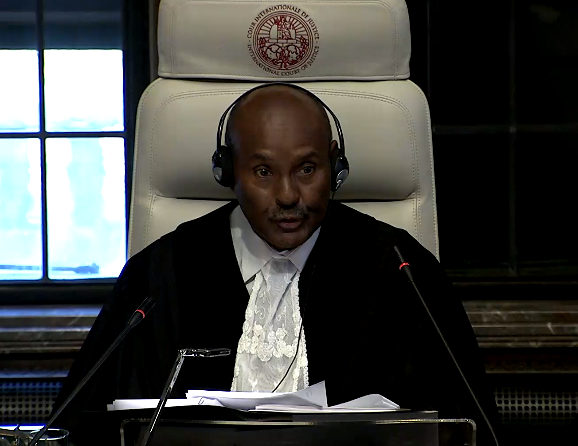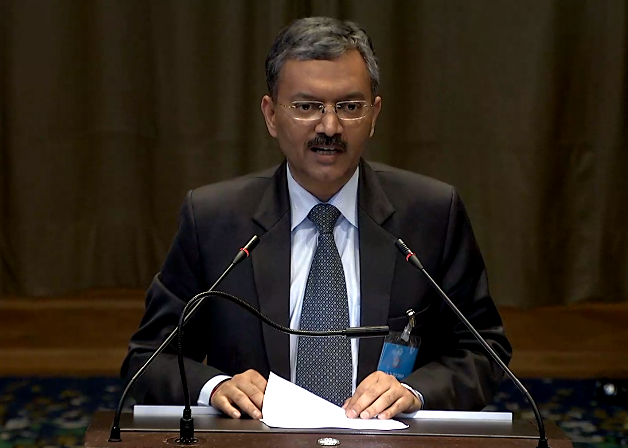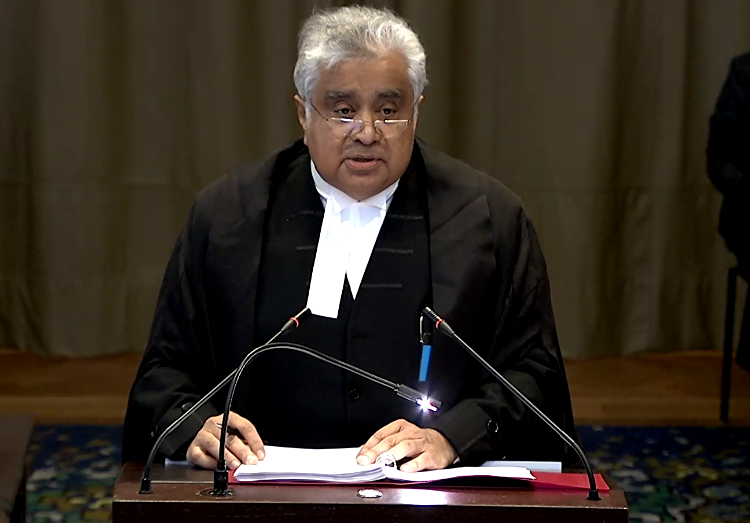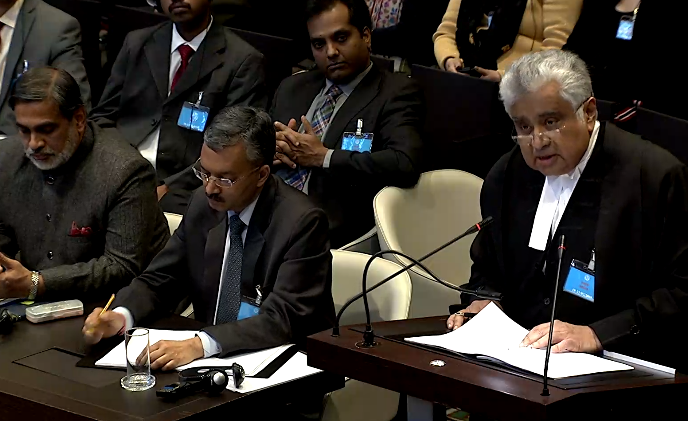India is presenting its case at the International Court of Justice, seeking cancellation of the death sentence of Kulbhushan Jadhav - an Indian national, accused of spying by Pakistan. On Day 3 of the case hearing, India replied to Pakistan. Kulbhushan Jadhav was sentenced to death by a Pakistani military court on charges of espionage and terrorism in 2017. India had approached the Hague-based International Court of Justice for "egregious" violation of the provisions of the Vienna Convention on Consular Relations, 1963, by Pakistan in the case. The International Court of Justice had halted his execution on India's appeal pending the final verdict by it.
Senior advocate senior Harish Salve, who is representing India before the International Court of Justice had said Pakistan is embarrassed to disclose its judgment in case.
On Day 1 of the hearing, India's advocate Harish Salve raised questions over how a military court could hold a trial for a civilian without giving him a due and transparent right to defend. India has maintained that Mr Jadhav, a former Naval officer-turned-businessman, was innocent and he had been kidnapped by Pakistani intelligence agencies from Iran.
Here are the Highlights of the hearing from the International Court of Justice:
Senior advocate Harish Salve said the Pulwama terror attack was carried out by a Pakistan-based entity.
Contending that Pakistan has been censured by various nations about its role in the spread of terror, Mr Salve said the US has called on Pakistan to end support to terrorism.
"In another attack in Iran, the Iranian side has said that Pakistan must be held accountable. Pakistan is under pressure from FATF (Financial Action Task Force, an international organisation that combats money laundering and financing of terror)," Mr Salve said in his closing arguments before the court.
Pakistan, Mr Salve said, is used a safe haven by UN proscribed terrorist entities and individuals like Dawood Ibrahim. "Prominent Pakistan newspaper Dawn carried (Nawaz) Sharif's interview in which he acknowledged Pakistan's role in 26/11? This interview has not been denied," he added.
Statement made yesterday by agent of Pak. Judge ad-hoc has been unable to attend proceedings due to temporary indisposition. Pak agent raised concerns with respect to this situation. He further stated that Pak while placing itself in the hands of the court is also obliged for another individual to be sworn-in. We assure both parties of smooth running of these proceedings.
It should be noted that once a judge ad-hoc has been chosen; and in the absence of any objection within time-limit, his appointment as judge ad-hoc in the case is confirmed by court. Indeed, in the present case, judge ad-hoc was sent case file and duly took part in all previous proceedings.
We recvd all written pleadings filed. He will receive all transcripts of oral proceedings and may also watch them through webcast. Follows that judge ad-hoc chosen by Pak has been participating in the case and may continue to do so. Having began his duties, a judge ad-hoc serves the court as an independent judge for remainder of the case.
The court has not received any evidence that judge ad-hoc is unable or unwilling to continue to exercise is duties as judge ad-hoc in this case. Even if a judge ad-hoc is not able to attend the hearing, he or she may be authorized by the court to take part in subsequent proceedings.
If judge ad-hoc is not able to be present with us tomorrow, there is a possibility of organizing such a sitting at an appropriate time in the near future. We come to an end of the sitting. The court will meet again tomorrow to hear second round of oral argument of Pak. The sitting is adjourned.
Pak is used a safe haven by UN proscribed terrorist entities and individuals like Dawood Ibrahim. Counsel for Pak says he has great respect for India but not its present incarnation. There was a time when the world respected Pak, today the world doesn't have the same respect for Pak in its own incarnation.
Prominent Pak newspaper Dawn carried Sharif's interview in which he acknowledged Pak's role in 26/11? This interview has not been denied. India has made out a case that there has been a violation of Vienna Convention, that in the absence of due process and various factors incl Pak's propaganda, this case calls for appropriate relief. Time has come for this court to take this law forward and make Article 36 a potent weapon for protecting human rights.
Senior Advocate Harish Salve mentioning #PulawamaTerrorAttack during the final arguments before International Court of Justice in the Kulbhushan Jadhav case. #icjhearing #PulwamaTerroristAttack #JusticeForJadhav pic.twitter.com/IKtAYMCI7u
- Bar & Bench (@barandbench) February 20, 2019



They are bound to be failings in the military courts trying civilians. Presumptuous to say that this court would go by an 'expert'. Judicial review is hopelessly insufficient. Pak's argument is that judicial review provided for is a sufficient safeguard. Pak Supreme Court doesn't think so. Article 10 of Pak's Constitution provides for due process.
Pak Army Act placed in first schedule and therefore immune of challenge on the ground that it violates due process. India submits that court should not sanctify trial by military courts of civilians, especially trial by Pak military courts. Fair and public hearing? Absent. Competent and independent tribunal? Absent. Counsel of own choice? Absent. Court will have to decide for itself whether it considers that such a system can be sanctified.
In Kasab case, the Indian Supreme Court held that it intended to examine material first-hand and to come to their own conclusions. This is called a review. Request for assistance a propaganda measure. Pak has continued to misuse opportunity provided by this court. Apart from showing propaganda, Jadhav has become a pawn for Pak to try and divert global attention from its own conduct. State sponsorship of terrorism, on 14th Feb 2019, an attack was carried out by a Pak based entity.
This has received global condemnation. The US has even called on Pak to end support to terrorism. In another attack in Iran, the Iranian side has side that Pak must be held accountable. Pak under pressure from FATF.
Yesterday they claimed they had clinching evidence of case against Jadhav. Substantive praise was heaped on India journalists. One must also believe what is written in the Quint by Mr. Swami. First para mentions that Jadhav was in Iran, if this is true then FIR is false, story of Pak Army is false.
Second article suggests that he was kidnapped from Iran. These are articles written by journalists and Pak swears by their credibility, this is what they have said. By hanging its case on possession of passport, Pak makes the case that India sponsored terrorism in Pak.
Language of convention can't be whittled down because the preamble provided the backdrop in which the treaty was created. Pak's assertions are unassailable, leap of faith again. 2008 bilateral agreement can not take away right provided by Article 36, the agreement would otherwise be rendered ineffective on account of Article 73.
Pak acknowledges that the treaty should seen as amplifying provisions of the conventions. India's case that there is no need to pronounce finally the construction of bilateral agreement. Pak doesn't run the extreme case that thew agreement supersedes convention. If Article 36 can not be whittled down, language of the treaty doesn't call for interpretation.
Article 36 should have the same meaning irrespective of the states involved. It must mean the same as it means between America and Brazil.
Pak had no doubt when they arrested Jadhav that he was an Indian natl. No legal assistance treaty on account of Pak's reticence to enter such treaty. Article 36 does not depend on complying with request for any mutual assistance. Article 36 came into play on the date of arrest or soon thereafter without any undue delay.
Pak ahs been reticent to share with the world and this court the judgement in which Jadhav was convicted. That judgement would show basis for conviction. India has repeatedly requested for evidence. There could no threat to existence of Pak is these documents are made available to India. I have little doubts that there was any substantive evidence of Jadhav's involvement.
Pak criticized India for blocking cross-examination of JP Singh. Pak sought to examine one the 2 experts to provide the court with an update the court. India opposed the request, since it required arrangements in advance of the hearings.
Clearly badly timed, or to borrow Pak's favorite expression, an attempt to ambush. On 18 Feb, 2019, late in the evening, a third request was made. All 3 requests made on Feb 18 were declined. This court on Feb 19 held that request was made on the day of opening of oral hearings and the request was not justified. In the course of its submissions, Pak criticized India for blocking of production of this evidence.
Reference to video of Jadhav meeting wife and mother, this is not on record. To accuse the other party of blocking evidence is clearly a criticism of order of the court. Mention of some money deposited in Jadhav's account and how it reached there. Our team hasn't mentioned the sum on money mentioned in the transcript deposit by way of pay. If it is on record, Id be happy to stand corrected.

Pakistan's Attorney General Anwar Mansoor Khan said his country's ad-hoc judge to the ICJ, Tassaduq Hussain Jillani, suffered a cardiac arrest on Monday during the first day of hearings of the case and requested that his replacement be sworn-in before he could make his argument.

- This Court doesn't need experts to help it decide whether Military Courts in Pakistan are due process compliant
- Pakistan has mischaracterised India's reading of the report on Military Courts as an attempt to mislead the Court
- Three attempts made by Pakistan to derail proceedings in this Court have failed
- On Pakistan's allegation that India was blocking cross-examination of Deputy High Commission JP Singh - Salve says Court had held that the issue was not relevant
- Pakistan attempted to produce video of Mr Jadhav's purported confession on February 18, before the oral hearings. The Court had declined to take the video on record. Pakistan attempted to bring evidence which was declined through oral submissions
- Indian nationals are not the kind whose nationality needs to be denied
- Pakistan had relied on Avena case, which goes against them. According to the case, once there is a probability that a detainee is a foreign national, consular access must be granted
- India denies existence of legal relations treaty with Pakistan, because of the latter's reticence. This was a point I made in the first round that has not been countered by Pakistan
- If Jadhav had been involved in subversive activities, irrespective of whether or not he had an Indian passport, he would have been tried for espionage
- India has repeatedly asked for a copy of the judgment convicting Jadhav, and the charges against. There would be no threat to security of Pakistan if they share these documents
- They claim to have clinching evidence on the basis of articles in the Indian press. Salve refers to a Quint article by Praveen Swamy. The story contradicts facts in Pakistan's FIR
- Pakistan relied on reports by the Indian press. These articles contradict the facts in Pakistan's FIR
- The 2008 bilateral agreement between India and Pakistan cannot take away rights conferred by Article 36
- As old lawyer saying goes, "When you are strong on law you hammer the law,when you are strong on facts you hammer the facts and when you are strong on neither you hammer the table." Bereft of a case, Pakistan has hammered the proverbial table.
- International Commission of Jurists and European Parliament have criticised the functioning of Pakistan's Military Courts. Pakistan has defended them by relying on reports by military experts
- Judicial Review by Pakistan courts has a narrow ambit, they have not interfered with military court decisions many times
- Supreme Court of Pakistan has suppressed operation of Peshawar High Court cited by Pakistan. On one hand, Pakistan is challenging that judgment in Supreme Court, on the other it is citing it in ICJ.
- In Kasab case, Supreme Court of India held that since it is case of death sentence, they examined materials on record first-hand
- It is surprising that Pakistan calls upon Security Council for legal relief when it otherwise turns a Nelson's eye to its own track record, Salve
- Judge ad-hoc Gilani (chosen by Pakistan) was given case files and participated in all court deliberations before these hearings. He will receive all transcripts of oral proceedings. He will continue to participate.
Harish Salve, while presenting India's case before the ICJ, drew the court's attention to the abusive language used by Pakistan through its counsel Khawar Qureshi on the second day of the hearing.
"The language echoed in this court... perhaps this Court may lay down some redlines. The transcript is peppered with words such as shameless, nonesense, disgraceful... India takes exception to being addressed in this fashion in an international court.
"India strongly objects to abusive language of Pakistan's counsel," Mr Salve said as the International Court of Justice began the second round of public hearing in the Kulbhushan Jadhav case.

